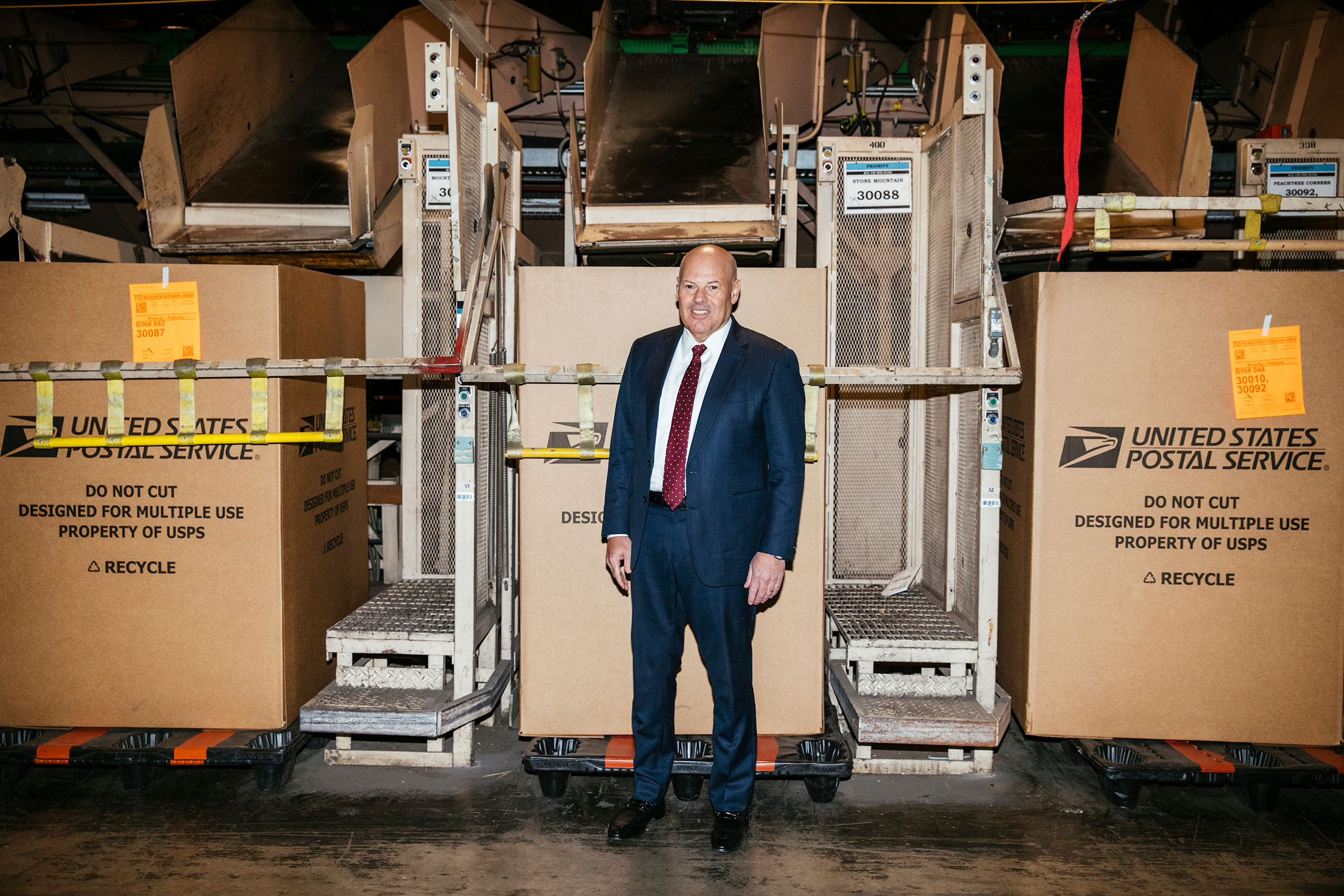Louis DeJoy thought his workday was done as he arrived home one evening in February 2022. The Postmaster General was locked in a grueling, monthslong battle with Congress over a bill to shake up the Postal Service. But as he settled in, his cell phone rang and, pulling it out, he saw who was calling and could already guess why. It was Senate Majority Leader Chuck Schumer. The second most powerful Democrat in America wanted to know how the whip count was coming.
As it happened, the count was coming along very nicely. DeJoy may be best known as the Trump-era GOP megadonor the left accused of meddling with mail-in voting to subvert the 2020 election. But by the time Schumer called him on that frigid winter night, DeJoy was on his way to convincing congressional Republicans—120 in the House and 29 in the Senate—to buy into a lengthy Democratic wish list of postal reforms. When President Joe Biden signed the landmark legislation into law two months later, it guaranteed a union-friendly version of six-day mail service and stabilized health coverage for the 650,000 USPS employees. “There’s no way we could have gotten [the] votes without Louis DeJoy,” says Jim Sauber, the chief of staff for the National Association of Letter Carriers at the time. “That’s for sure.”
More from TIME
The notion that DeJoy, 65, would help advance a key Democratic agenda item would have seemed unfathomable a few years ago. But to the astonishment of many in Washington, the man Democrats once denounced as a threat to American democracy has become one of their most important allies in government. Defying the far right, he delivered more than 500 million COVID-19 test kits to Americans in the winter of 2022. Crossing conservatives last December, he agreed to transition the Postal Service’s entire fleet to electric vehicles by 2026. DeJoy’s capstone collaboration with Democrats was the Postal Service Reform Act, which is arguably the most bipartisan piece of major legislation in the Biden era, drawing 10 more GOP Senate votes than the $1 trillion infrastructure bill.
DeJoy may be the only person on earth who could have delivered these wins for America’s beloved, beleaguered agency. That’s partly because of the perverse credibility his association with former President Donald Trump and the scandalous 2020 headlines give him with Republicans. It’s also his stubborn insistence that he wasn’t going to allow allegations levied against him in the thick of an inflammatory political season define him.
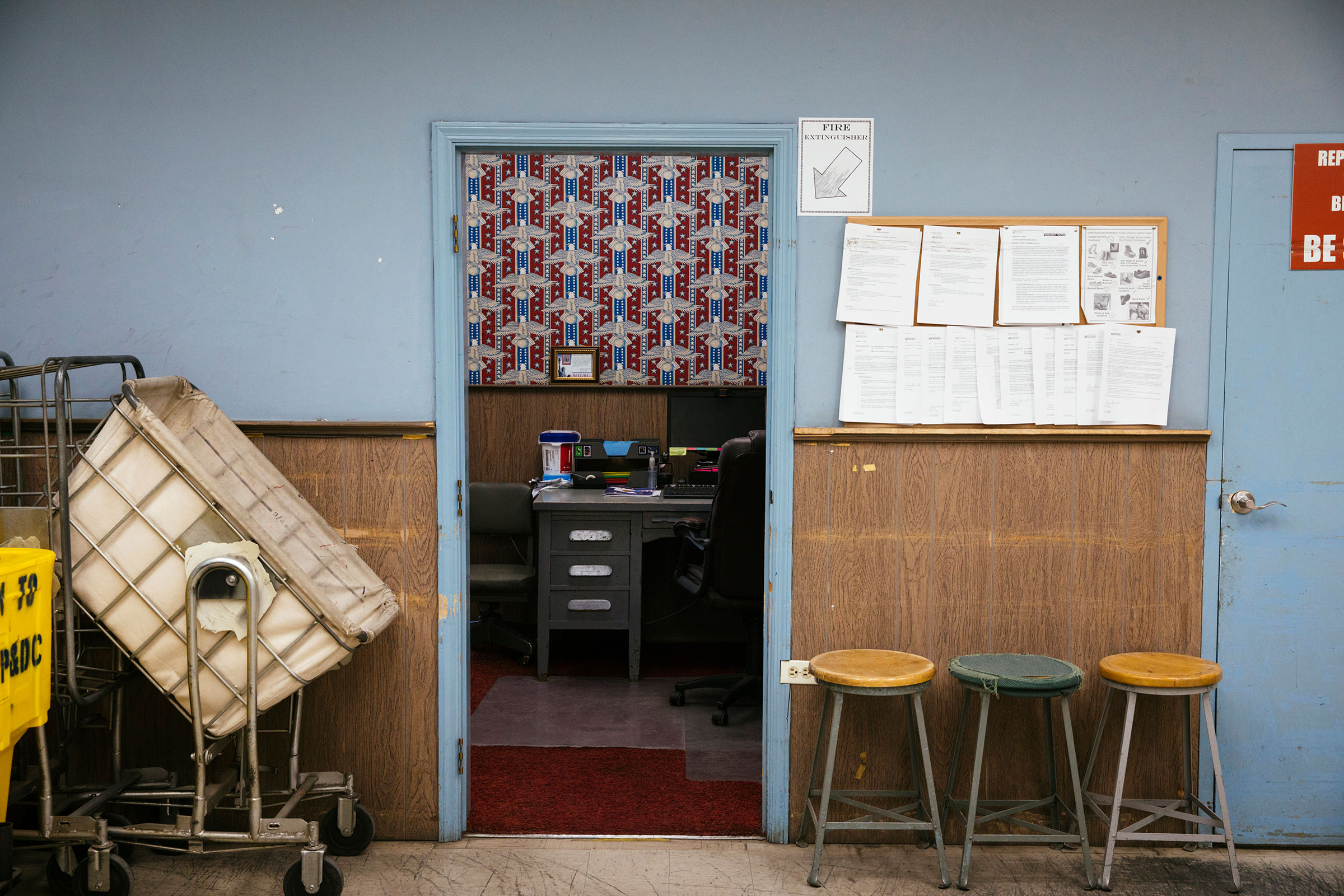
Sitting at a long oak table above a 400,000-sq.-ft. postal service processing center outside Atlanta in February, DeJoy, sporting a tailored blue suit and a shiny silver Rolex, ticks off in his heavy Brooklyn accent the details of his demonization: ad hominem attacks in the media, congressional scrutiny, lawsuits, federal investigations. Even his children needed a security detail while they were off at college. It was hell, he says, but not enough to make him quit. “I would not want to live the rest of my life if I walked away because of this bullsh-t,” he says. “It’s that simple.”
He had other reasons for staying, too. His Nixon-to-China-like efforts on the postal reform bill helped DeJoy secure a broad mandate to transform the agency. Drawing on his decades as a business executive, when he built and sold a logistics firm worth north of $600 million, DeJoy is enacting a 10-year plan—apart from the reforms—that aims to remake a delivery service that deals increasingly less with traditional mail and more with packages.
The plan grows the agency, building new processing centers and centralizing the delivery network. It converts more than 100,000 part-time employees to full-time. And it adds new services, such as partnerships with local retailers to help them compete with Amazon. These potentially dramatic changes are a chief reason why the postal unions have embraced the self-made man who shares some of their blue-collar roots.
Still, it won’t be easy. DeJoy is a prickly but flexible businessman who has at times struggled to adapt to operating within the constraints of a government bureaucracy. When he ordered postal trucks to “run on time” in July 2020, he set off a chain of events that led to a slowdown of mail delivery for weeks as trucks left their depots without any mail. The misstep helped fuel reports of attempts to undermine the 2020 election, reports that proved to be erroneous but continue to stoke distrust of him among progressives.
While the unions and the Biden-appointed Democratic majority on the USPS Board of Governors have bought into his plan, there remains fierce resistance from some in Congress, largely because it raises rates and relies more on trucks than planes to move mail and packages across the country, thereby slowing down the delivery of some first-class service. He has faced multiple ethics probes, all of which appear to have been dropped. And there are plenty of Republicans who still would like to see the Post Office die through privatization.
That remains a real possibility. When DeJoy started, the USPS was months away from running out of money. His mission, he says, is to make the Postal Service not only more efficient, but eventually profitable (something it hasn’t been since 2006) and to beat out FedEx and UPS, private delivery firms that pose an existential threat. Says DeJoy: “That’s what I’m trying to do: to set the organization up to compete.” He also has a personal stake in the effort. “He is fighting for redemption,” says Ron Bloom, a former Democratic member of the USPS Board of Governors. “That’s what he wants you to write whenever he rides off into the sunset— that he executed the greatest corporate turnaround in history.”
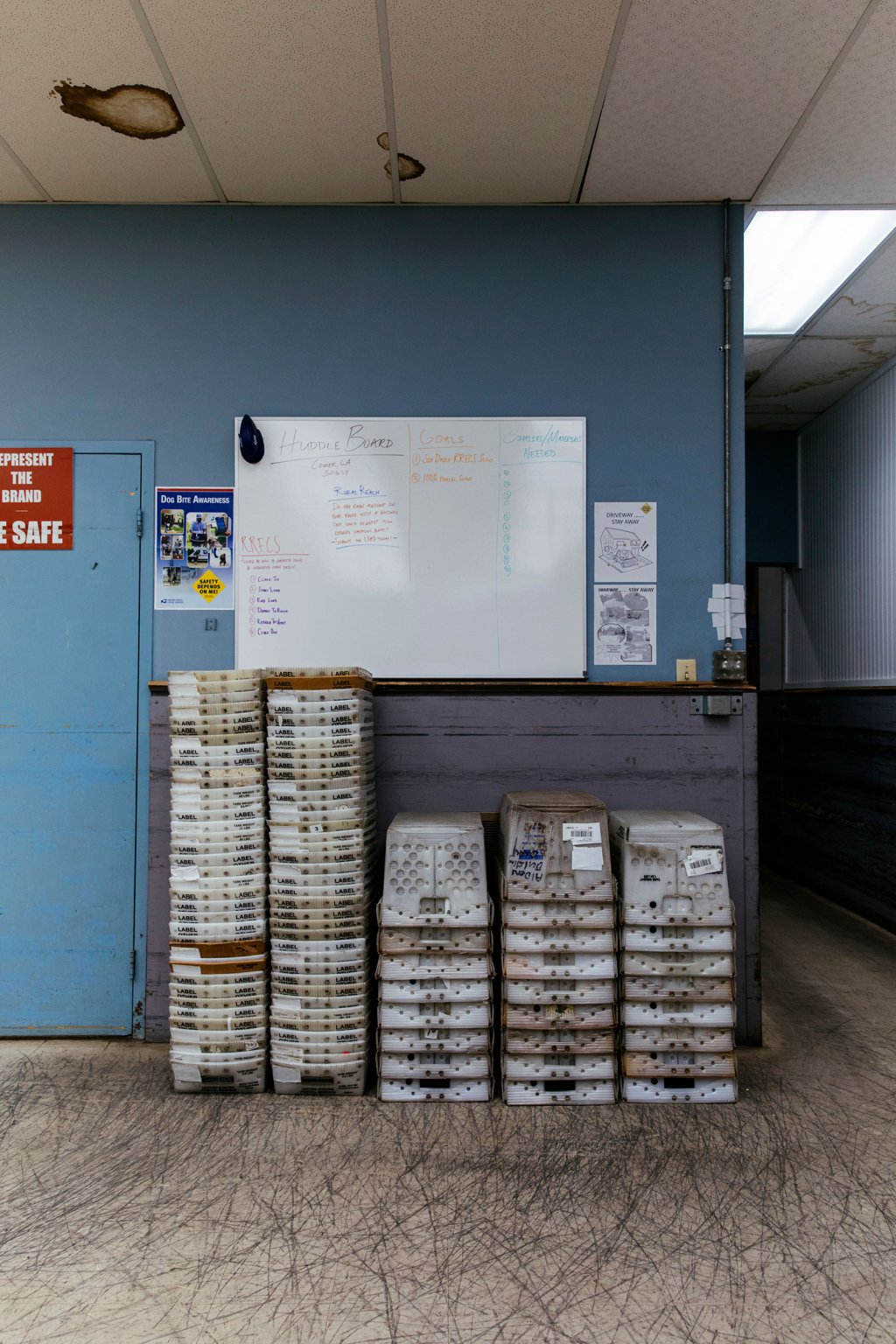
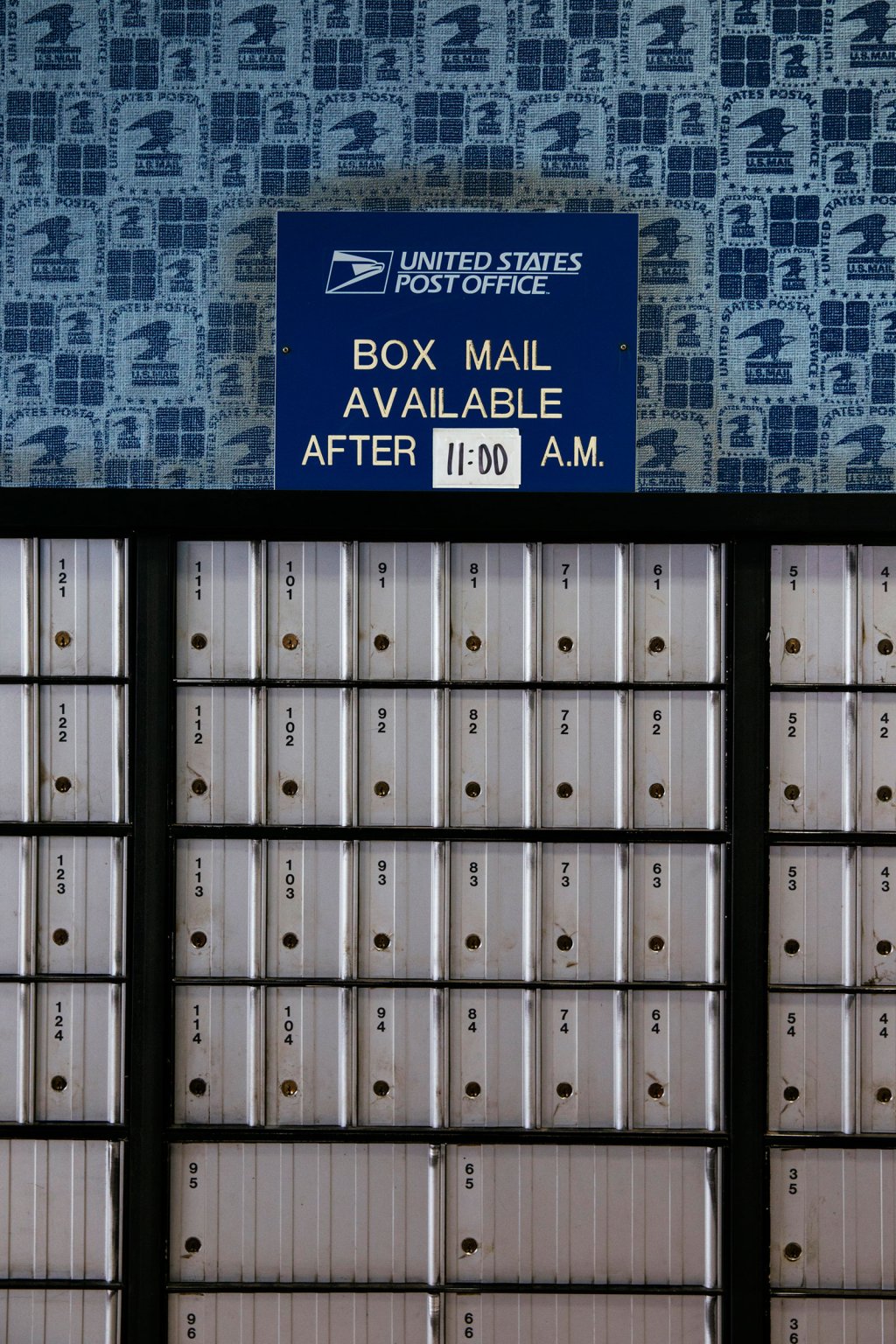
Exhibit A in DeJoy’s venture is the USPS regional processing center in Atlanta, and as he walked through it in early February, he was eager to talk it up. The plant is replete with new equipment. Nowhere can you escape the hum of construction. Crews are installing charging stations for the soon-to-come electric vehicles. Postal workers keep approaching him. It’s a far cry from where things were when he started. “I used to walk into a plant and, like, one or two of them would walk over,” he says. “They would ask, ‘Hey, how’s my buddy?’” They were talking about Trump. “I was like, ‘I don’t know! I don’t talk to him!’”
DeJoy grew up in working-class Brooklyn, the son of second-generation Italian immigrants and the oldest of five children. When he was 11, they moved to Long Island. DeJoy’s father was frequently absent, he says, because he was on the road as a self-employed truck driver. By high school, DeJoy craved a different lifestyle. “I was interested in money,” he says, with a smirk on his face. He was also desperate to escape.
So he enrolled in Stetson University, in Florida, where he earned a degree in accounting. After graduating and spending a few years in Fort Lauderdale as a CPA, he was beckoned home. His father had been assaulted on the job and nearly killed. “It was New York. It was the trucking business,” DeJoy says in a matter-of-fact tone. “He got beat up.”
While his father convalesced, DeJoy took control of the family business. His first meeting was with the bank, which warned him it would shutter the firm’s account if it bounced another check. DeJoy then overhauled the operation—changing schedules, cutting expenses, adding new routes. The few years he planned to spend rehabilitating the company became a few decades, and New Breed Logistics grew from 10 employees to 10,000. In the 1990s, he relocated the headquarters to Greensboro, N.C., where his clients included Boeing, Disney, Verizon, the Department of Defense, and the Postal Service itself. In 2014, he sold the firm for $615 million.
As he built his fortune, DeJoy became a major player in GOP politics. In 2000, he held fundraisers for George W. Bush. After Bush won, the President appointed DeJoy’s wife, Aldona Wos, as U.S. ambassador to Estonia. In the years to come, their North Carolina mansion became a required visit for every serious Republican hopeful, including Trump. “I did a lot of work for the President,” DeJoy tells me. “Raised a lot of money. He was a lot of fun to do this work with.” Once in office, Trump offered DeJoy an ambassadorship. He turned it down. “I wanted something I could fix,” he says.
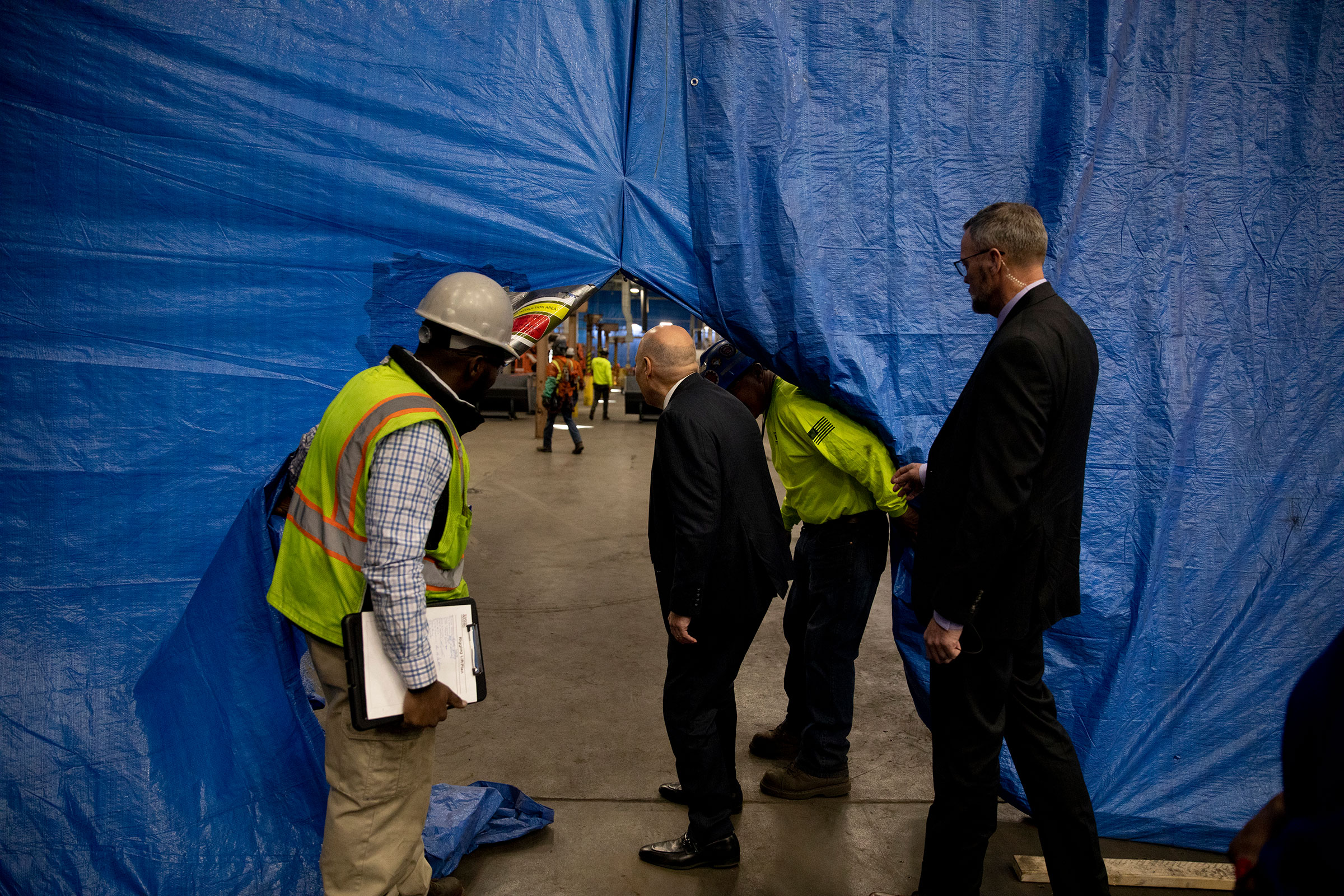
DeJoy remained on the board of another logistics firm and ran a real estate investment shop. He was also planning to serve as an official host of the 2020 Republican National Convention, originally slated to be held in Charlotte, N.C. But then, in January 2020, he got a call from a USPS recruiter. They wanted to talk to him about becoming Postmaster General.
Roman Martinez, a Trump-appointed member of the USPS Board of Governors who helped lead the search, says DeJoy beat out hundreds of others because of his logistics expertise, but faced potential Democratic opposition in the Byzantine process required to get the job. “We knew he would have a bullseye on his back because of his Republican connections,” Martinez says. “But we felt that what he brought to the table was worth that risk, because he was the kind of guy who could shake the place up. And the place needed shaking up.”
Both Martinez and DeJoy insist that Trump was not involved in the hiring process. “I swear on my mother’s life, the President had nothing to do with it,” DeJoy says. “He didn’t know anything about it. I would never even think to tell him before I had a decision, because who knows what he could do with his tweets!” After DeJoy accepted the position in May 2020, he called the President to let him know he was taking the job and could no longer be part of the convention. Trump, he says, was encouraging, telling him to “go do it.”
If DeJoy wanted a fix-it project, he was getting one. In April 2020, his predecessor warned that the agency was at risk of financial insolvency by the fall. When DeJoy took the helm on June 16, with the pandemic raging and demand for mail-in voting surging countrywide, it wasn’t clear the agency would be able to deliver last-minute absentee ballots in time. Trump, who despised mail-in voting, made matters worse by regularly trashing the USPS and refusing to sign the first COVID-19 relief bill until Congress removed increased funding for the agency.
Read more: Republicans Move to Embrace Mail Voting After Midterm Losses
A month into the job, DeJoy made a consequential snap decision. He had learned that mail trucks were routinely leaving behind schedule, as drivers would wait for more mail to arrive. Even then, they were less than half full. DeJoy told his deputies to “run the trucks on time.” The decision was made in a style that even DeJoy’s defenders characterize as more befitting a corporate executive than a high-level bureaucrat. At first, it seemed to be going swimmingly. “I’m getting reports saying the trucks are running on time,” DeJoy recalls as he pumps his fists in the air and laughs. “Look at this—we’re doing great!” There was one problem. “Nobody’s telling me we’re not putting the mail on the trucks!”
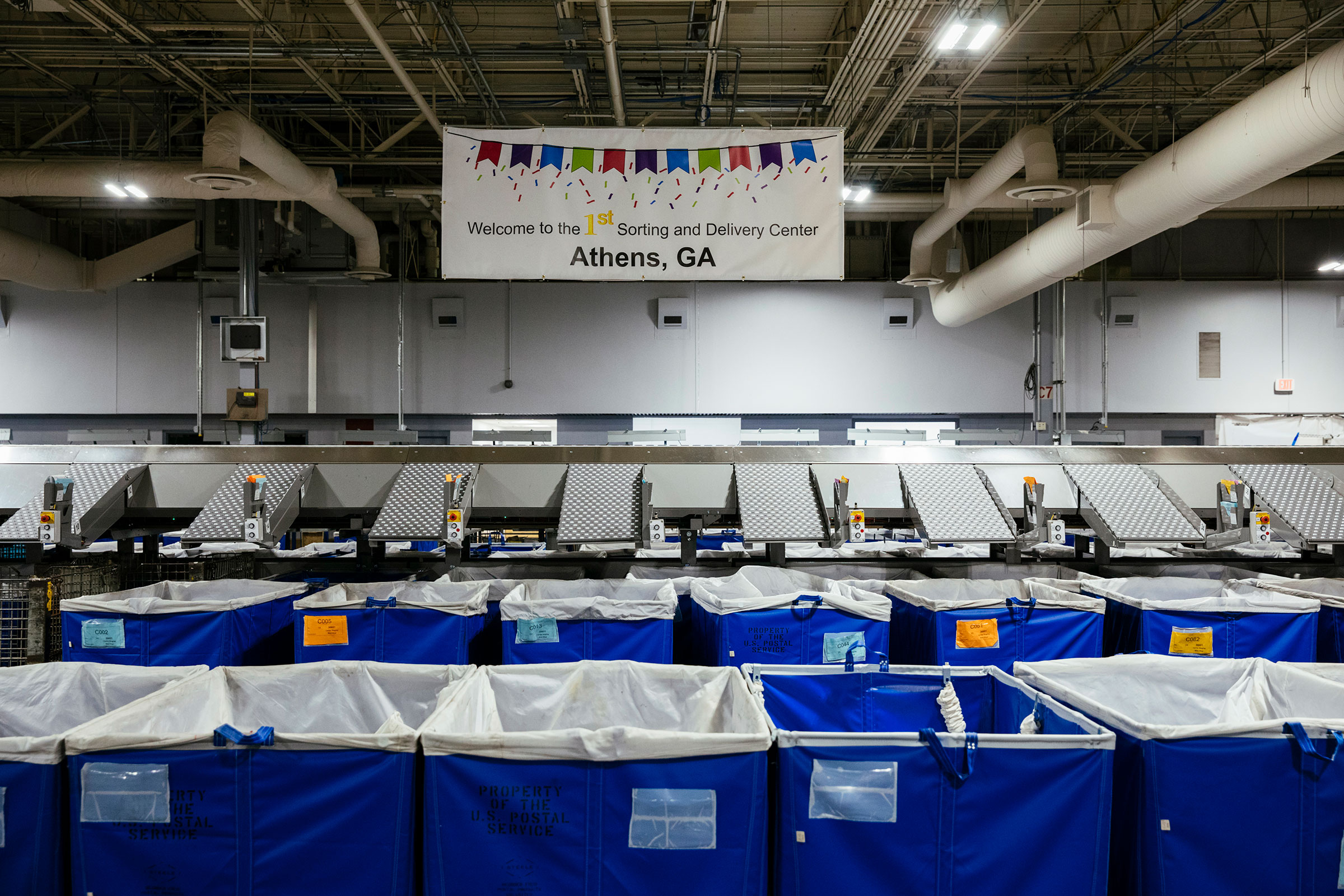
The snafu led to major slowdowns in mail service—which was compounded by the fact that roughly 30% of the USPS workforce was out with the virus—leading to a national panic. Americans were relying more on the Post Office amid the pandemic, and within months millions of voters were expected to vote by mail. The problem was resolved a few weeks later—DeJoy set up a new team to monitor operations and troubleshoot any lingering issues—but the debacle helped to fuel an emerging narrative that DeJoy, a major Trump donor, was out to sabotage the election.
DeJoy’s antagonists also started spreading allegations that he was whisking away sorting machines and iconic blue mailboxes to subvert the vote. In fact, the USPS had been cutting back the boxes for decades because of the declining use of first-class mail and the sorting machines were obsolete and had been sitting under tarps, according to Amber McReynolds, a Biden appointee on the USPS Board of Governors. McReynolds was, at the time, working closely with the Postal Service as CEO of the National Vote at Home Institute. “I tried to correct disinformation as much as I could,” she says. DeJoy was also accused in the press and by some in Congress of eliminating overtime for postal workers. Union leaders insist otherwise. “Believe me, if they cut off overtime, our members would tell us,” says Sauber, the former senior postal union official.
With Trump openly undermining the vote, Democrats were nevertheless convinced that DeJoy was scheming to hamper Democratic turnout. “It was a deliberate and malign effort to disrupt that election in favor of Trump,” says Rep. Gerry Connolly of Virginia. In August, state attorneys general and activist groups filed lawsuits accusing DeJoy of trying to disenfranchise voters. Speaker Nancy Pelosi interrupted the House’s summer recess to vote to revoke any USPS policy changes until after the pandemic. There was also increasing pressure on DeJoy to resign. “Was I going to leave and be the villain, the character that they were trying to make me out to be? No way in hell,” he says. “They would have had to shoot me or cuff me and put me in jail or whatever.”
Amid the uproar, DeJoy announced he was suspending the measures “to avoid even the appearance” of impacting the election. When he testified before Congress, his image as a Trumpian villain only grew. One Democratic lawmaker asked him, “Mr. DeJoy, is your backup plan to be pardoned like Roger Stone?” DeJoy, defensive and combative, didn’t win over any adversaries. By the fall, a federal judge had said he tried to tamper with the vote, and the USPS Inspector General excoriated his operational changes to the agency.
Ultimately, voting by mail was a resounding success. DeJoy embraced a union idea to expedite mail ballot delivery and set up a panel to oversee election mail. As a record 43% of Americans voted by mail, the USPS handled more than 135 million mail ballots. Roughly 94% were processed on time, and 99% made it to election boards within a week. “Look what happened,” McReynolds says. “We had the best delivery rates that we’ve ever had.”
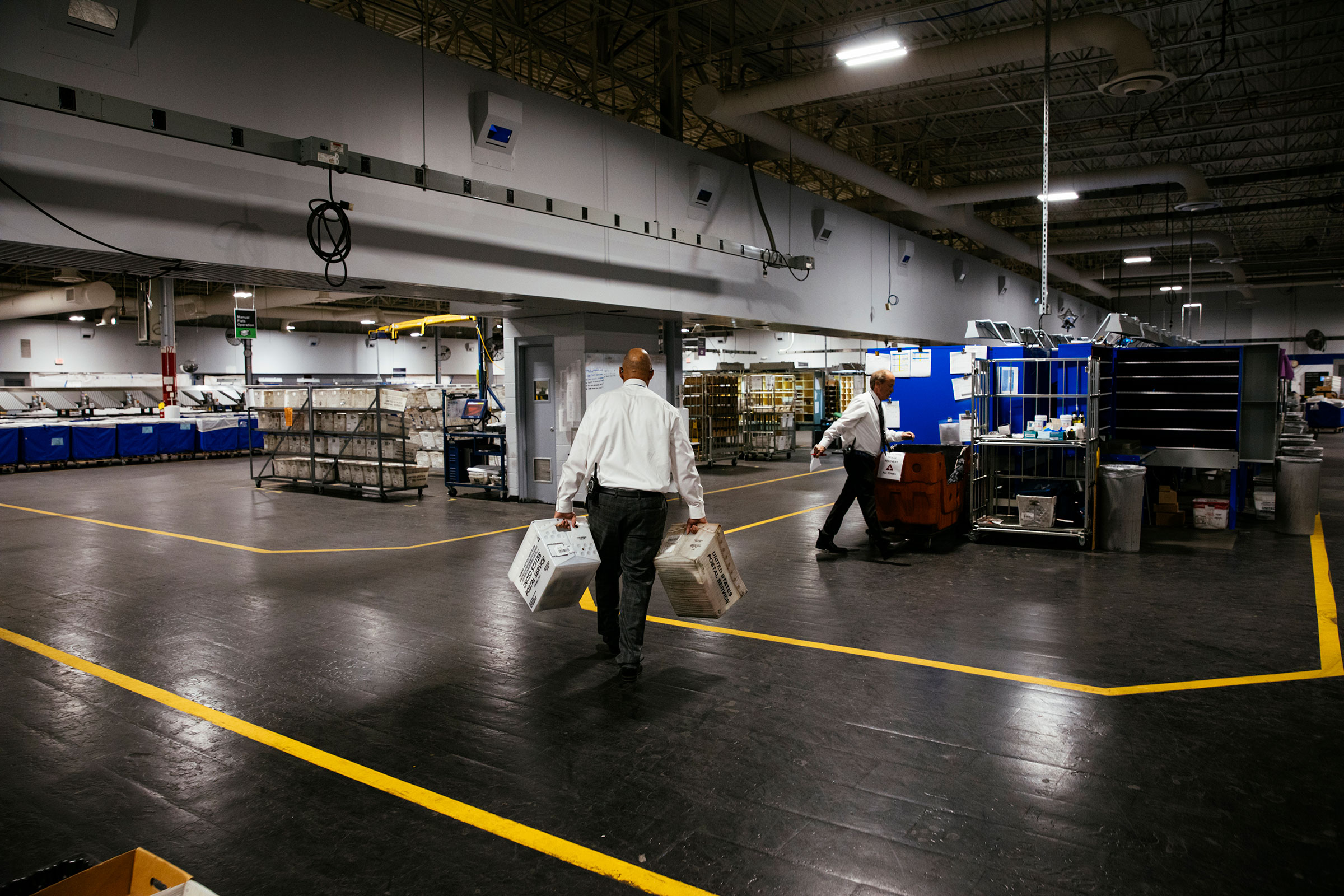
At the start of the Biden administration, many assumed DeJoy’s days as Postmaster General were numbered. Others had different ideas. “With all the outcry and all the Trump this and Trump that,” says Fred Rolando, then the president of the National Association of Letter Carriers, “I just saw opportunity.” Rolando and a group of union heads and key Democrats believed DeJoy’s standing with the GOP could be the ticket to passing postal reform, which a small bipartisan group of lawmakers had been pushing for years. “He presented an opportunity that wasn’t there before,” adds Rolando.
Then-Rep. Carolyn Maloney, the chair of the House Oversight Committee at the time, brokered a compromise with Rep. James Comer, the Kentucky Republican, union leaders, and DeJoy. The main priority, they all agreed, was repealing a George W. Bush-era mandate that required the Postal Service to pre-pay health plans for retirees, an onerous requirement imposed on no other federal agency. It was bleeding the USPS dry. By ending the pre-funding requirement the agency would be free of $58 billion of liabilities.
Many GOP lawmakers reflexively saw the proposal as a bailout, but DeJoy was uniquely positioned to convince them it wasn’t. “The key to getting Republicans’ support, for me, was to prove to Republicans that we had the right person in place to make the reforms,” says Comer, whose grandmother was a letter carrier. “You can’t reform a government agency with a career bureaucrat.” It wasn’t easy on the other side of the aisle, either. Maloney took considerable heat from her own party for working with DeJoy. “I used to tell them: Do you want to fire him, or do you want postal reform?” she says.
DeJoy’s lobbying effort reached a peak in February 2022, when Comer brought him to Capitol Hill to address the entire GOP caucus. It was rowdy. Some of the lawmakers shouted at DeJoy, with one accusing him of pushing the legislation only to secure a higher pension. “There’s just as many Republicans who annoy the sh-t out of me as there are Democrats,” DeJoy says. Be that as it may, DeJoy still flipped votes. “There were a lot of undecideds,” Comer recalls. “Once they listened to him talk from a business standpoint, and how he was specifically going to cut losses at the Postal Service without harming performance, I think they were sold.” The next day, the legislation passed the House with 342 votes.
In the Senate, DeJoy kept in regular touch with Schumer, and the bill’s two co-sponsors, Democrat Gary Peters of Michigan and Republican Rob Portman of Ohio. Bloom, a former USPS Board of Governors member, remembers Peters telling him, “I can’t get the Republican votes without DeJoy.” It passed the 50-50 Senate with 79 votes.
DeJoy’s pivotal role in breaking a 20-year logjam wasn’t enough to earn him an embrace from Biden. The White House didn’t invite him to the bill-signing ceremony until the night before. The event itself would leave the public with no clue that the Postmaster had anything to do with the bill: DeJoy wasn’t mentioned in the President’s remarks, and wasn’t on stage for the signing. He was sitting in the back of the room.
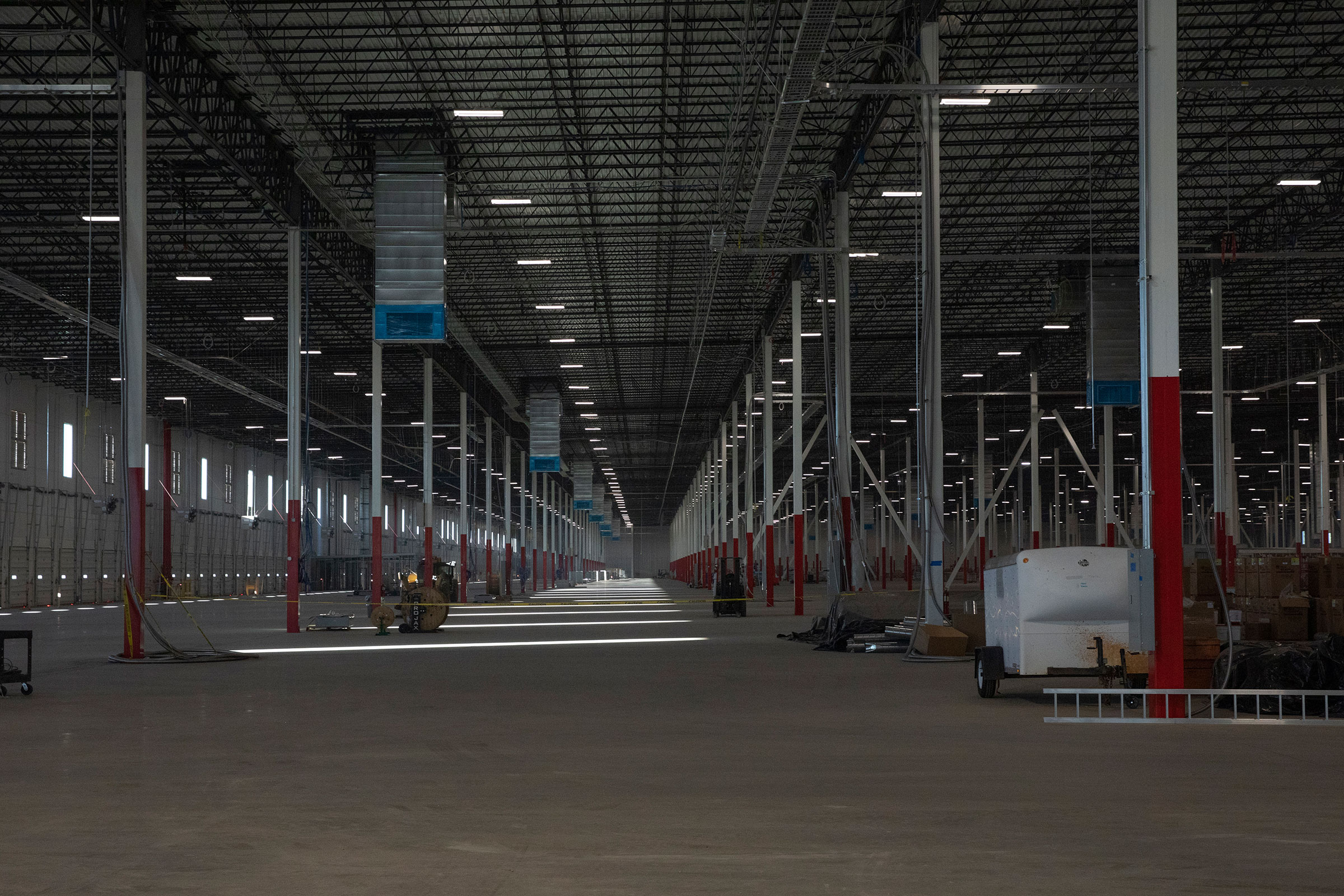
DeJoy is not one for hard feelings. Six months later, after Biden signed the Inflation Reduction Act allocating $3 billion to help the Postal Service go electric, he reached out to John Podesta, Biden’s climate adviser. By Christmas 2022, they announced a plan for the USPS to fully electrify in four years. “Given the earlier track record, I didn’t know what to expect,” says Podesta. “I didn’t find him to be ideological. He’s pretty straightforward on what he can deliver. He walked into an institution that had a lot of issues, but I think he has tackled them in a way that’s brought over his skeptics—of which I probably counted myself among them.”
There have been other victories and vindications. Last winter, he worked with the White House to deliver half a billion COVID-19 test kits to Americans nationwide. Tim Manning, then the Biden Administration’s COVID-19 supply coordinator, says his team arranged a call with DeJoy’s underlings in December 2021 to float the idea. DeJoy heard about it and invited himself. “Louis jumped on and said, ‘Yeah, we’ll make this happen,’” Manning tells me. A month later, the test kits went out; roughly 60% of the orders were fulfilled within 24 hours, 90% within 48 hours. Meanwhile, there’s no longer an ethical cloud hanging over DeJoy’s head. Both the Federal Election Commission and the FBI closed investigations into him related to campaign contributions, and the USPS Inspector General said he met “all applicable ethics requirements related to disclosure, recusal, and divestment” pertaining to his holdings with Postal Service contractors upon taking the job. And the midterms went exceedingly well—99% of all 2022 election mail was delivered within three days.
Yet it hasn’t all been a redemption tour for perhaps the most famous Postmaster General since Benjamin Franklin. DeJoy remains a favorite target of the left. Over the last three years, progressive organizations have sent out “Fire Louis DeJoy” fundraising emails like clockwork. In the last few months, Democrats like Sen. Tammy Baldwin of Wisconsin and groups like the Democratic Governors Association have bought Facebook ads to raise money off calling for DeJoy’s ouster. Some of DeJoy’s allies, on both the right and left, cynically suspect that some Democrats secretly relish having DeJoy in his role as a foil, especially with Trump out of office. Neither Baldwin nor the DGA responded to a request for comment.
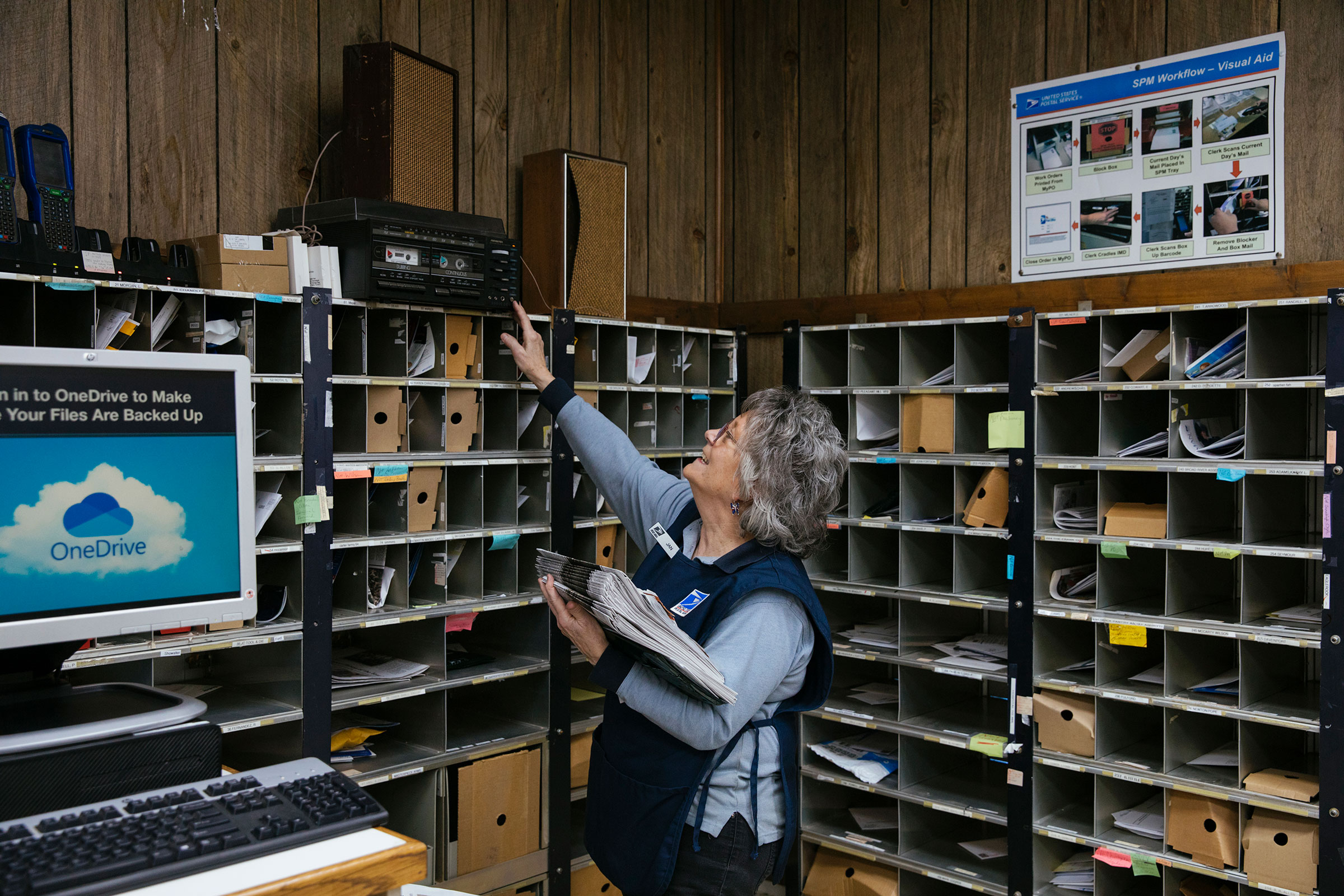
There have been other hits, too. Last October, a federal judge ruled that DeJoy hurt mail delivery ahead of the 2020 election, laying blame on the fact that he didn’t seek guidance from the Postal Regulatory Commission before initiating any policy changes. “What does he know about what the hell went on in the Postal Service?” DeJoy tells me when I ask him about the ruling. “He’s a judge. He’s looking at a bunch of papers. He’s reading a bunch of press. What was he going to say, ‘I did an excellent job?’ I think they overstepped their bounds.”
All the while, DeJoy’s 10-year plan to rescue the USPS is in motion. A new million-sq-ft. regional processing plant near Atlanta, set to open next year, is one of 60 such facilities he aims to launch. And the Postal Service’s financial situation is improving, he stresses, saying the USPS would have broken even in 2022 if not for inflation.
Whether DeJoy succeeds will have substantial implications for not only the Postal Service, but the nation. The USPS is one of the only government agencies enshrined in the Constitution, and it has long been responsible for advancing certain social goals; its universal service obligation makes it one of the prime engines of regional equality. On DeJoy’s shoulders, in other words, is the preservation of that rare entity that reaches every American in every corner of the country.
How long DeJoy will be there to oversee his plan is another matter. His tenure as Postmaster General is up to the Board—and him. DeJoy has his own metrics for success: saving the USPS may be the only way to transcend his 2020 infamy. “I hope all this stupid nonsense stuff is not on my obituary,” he tells me. In the next two or three years, he says, the USPS may be transformed enough for him to move on. “I don’t like to leave a job undone.” After that? “I don’t know if it’s my last rodeo,” says DeJoy. “I feel pretty young. I got other things to do.”
More Must-Reads from TIME
- The New Face of Doctor Who
- Putin’s Enemies Are Struggling to Unite
- Women Say They Were Pressured Into Long-Term Birth Control
- Scientists Are Finding Out Just How Toxic Your Stuff Is
- Boredom Makes Us Human
- John Mulaney Has What Late Night Needs
- The 100 Most Influential People of 2024
- Want Weekly Recs on What to Watch, Read, and More? Sign Up for Worth Your Time
Contact us at letters@time.com
